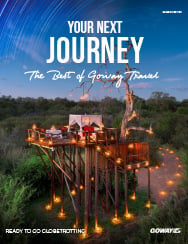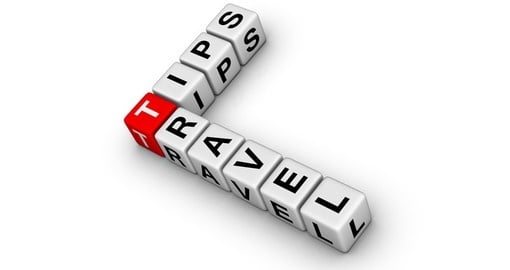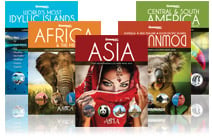Travel Tips for Globetrotters
Here are over 60 tips to help keep you safe, sane and creditworthy when next you go globetrotting. They have been compiled by the editors of Globetrotting Magazine from their experiences on the road. As we would like to add to this list we invite you to review and submit relevant tips you feel will be helpful to fellow international travellers.
| 1. Be aware of when your passport will expire. Many countries require a validity of 6 months and some countries require you to have blank pages. |
| 2. Take Cover.. Some countries now require proof of health insurance coverage before being granted entry. |
| 3. Plan to have rest days in your itinerary so you can unwind and recharge. You do not want to burn yourself out on holidays. |
| 4. Pack healthy snacks for your flights and stay hydrated. |
| 5. On arrival after a long haul flight go for a jog, a brisk walk or swim, to get your blood circulating and help with adjusting to local time. |
| 6. Stay fit on your travels. Use a hotel's fitness centre where available. |
| 7. Take a business card of the hotel you are staying at in case you get lost and need to catch a taxi/Uber back. |
| 8. Discuss your trip with your doctor. Note too that some vaccinations might not work in some destinations. (e.g. high altitudes) |
| 9. Carry all prescriptions and over-the-counter medicines in their original containers. |
| 10. Carry a copy of prescriptions in case your important medication is lost. |
| 11. Always carry Imodium in your carry-on gear (it is usually sold at airports). |
| 12. Visit your dentist before you leave. |
| 13. If you wear glasses take a spare pair. |
| 14. If you have a hearing aid take extra batteries as they will possibly be hard to find. |
| 15. Ask a local. Your hotel concierge can be good, but the friendly waitress at the local coffee shop or juice bar could be better |
| 16. Alert your credit card providers as to when, where and how long you will be travelling. |
| 17. If travelling with a companion, swap extra credit cards. If you lose your wallet your companion will have your backup card. It is also a good idea to divvy up your travel cash and credit cards into multiple safe spots. |
| 18. Before you leave, go through your wallet and take out everything except the necessities for your trip. |
| 19. Have a record of your passport details that can easily be accessed in the case of loss. |
20. Understand your insurance coverage for:
|
| 21. Make sure you know who to contact and how to make insurance claims to avoid any extra stress. |
| 22. Suitcases with four wheels will definitely be appreciated. |
| 23. Turn your data roaming off on your cell. |
| 24. When travelling outside of North America you will probably need an electricity converter, and often a voltage adaptor. A double head converter is useful for multi-chargers. |
| 25. A plastic poncho could be very useful as might super glue and a Swiss Army style knife (in your checked luggage) |
| 26. When renting a motorcycle make sure you wear a helmet even though the locals don't |
| 27. Always check your bags every time they are loaded in vehicles, airports, hotels, etc. Mistakes and mischief can happen |
| 28. As soon as you have settled into your hotel room, check out where the nearest exits are in case of fire and mentally plan your escape |
| 29. Housekeepers don't always check alarm clocks in rooms, you should! You should use it to wake up for early flights as hotel staff don't always get it right |
| 30. When impressed with the glitter of duty-free shops try to remember their rent is high. Knowing the price at the home of the items you want to buy help |
| 31. When arriving at a hotel early in the morning and your room might not be ready it helps if the hotel has a pool, spa or business floor where you can relax |
| 32. Plastic and zip lock bags are very useful. (i.e. dirty clothes) |
| 33. Bring some small packets of laundry detergent. Socks and underwear washed in the hotel bathroom dry quicker when rolled into a towel like a sausage |
| 34. Compression stockings are supposed to combat deep-vein thrombosis (DVT) on long-distance flights. Medical experts recommend a walk and a stretch as often as possible, drink lots of water and avoid alcohol. Some doctors also recommend aspirin. |
| 35. Before each flight make sure you remove from your luggage old tags and barcode stickers and check you have contact details on both, the outside and inside of your luggage |
| 36. Smart suitcase packers bring clothes in neutral colours that can mix and match and only pack shoes that can be worn with multiple outfits |
| 37. You may only carry liquids, aerosols and gels (LAGs) in your hand luggage in containers that have a maximum capacity of 100ml each, all packed in a re-sealable transparent plastic bag, the capacity of the bag must not exceed one litre |
| 38. To avoid baggage fees, be aware of restrictions on the weight, size and number of bags you may take |
| 39. Take along a change of clothes in your carry on in the event your luggage gets delayed |
| 40. Always pack a smart outfit. You never know when you will need it |
| 41. Use several “bright” labels for your check-in luggage so you can quickly identify them at the carousel |
| 42. Visiting local pubs and farmers markets give you an insider's view of the people and region you are visiting. Food is a big part of the travel experience so it is a must to try local delicacies |
| 43. Get fit before you travel. The fitter you are the more fun you will have on your trip |
| 44. When travelling don't stress too much as everything will probably work out in the end. Sticky situations can often work out to be a highlight of your trip |
| 45. If you are concerned about your hotel room security, hang the “do not disturb” sign on the door when you leave |
| 46. To avoid scams, be alert for distractions such as thieves who pose as willing and helpful locals. E.g. dropping a bag of shopping, being asked to complete a survey, even bird poo on the back of your jacket |
| 47. If you can't afford travel insurance you can't afford to travel. Young travellers are well known for not taking out adequate insurance |
| 48. On cruises, purchase optional shore excursions before boarding the ship. Doing so will help you avoid long lines and allow you to disembark earlier than those purchasing excursions at the last minute |
| 49. Be careful choosing to take along an irreplaceable jewel or memento |
| 50. You should carry sanitizing wipes. They are very useful for T.V. remotes and phones which are the biggest carriers of bacteria in a hotel guestroom |
| 51. Make sure you pack comfortable walking shoes |
| 52. A small bottle of hand sanitizer can be very useful in some countries where it is sometimes hard to find a bathroom with soap and water |
| 53. Work out a simple currency conversion formula before you go or ASAP upon arrival (e.g. $1 equals xx in new currency) |
| 54. Use your own calculator when working out exchange rates – don't rely on the money changer – his may be "rigged" |
| 55. It is good to know the tipping culture of countries you are visiting. Always carry small change to cover tips |
| 56. Make sure your carry-on luggage is suitably tagged with correct contact addresses |
| 57. An extra carry bag (suitably tagged) could be useful |
| 58. To speed up the security process at airports and avoid losing things put as much loose gear (e.g. camera) in your carry on. It is possible to get distracted and forget loose items |
| 59. In some countries you can be detained for photographing such things as police and government buildings. When in doubt ask for permission |
| 60. If you wear contact lenses, bring glasses for the airplane. The recycled air could dry out your eyes and make you uncomfortable |
| 61. Buying foreign currency at the airport can be expensive. Travelex offers online purchase of most currencies with pickup and delivery (for a fee) options. At destination most countries allow you to withdraw local currency from ATM's using your bank card |
| 62. In some countries US dollars are an official or unofficial secondary currency so it is wise to keep a few greenbacks at the ready (small denomination and good condition) |
| 63. Store important travel documents, including itineraries, airline tickets, passport copies and insurance details, in an online cloud storage system such as Dropbox or Google Drive, so you can access them on all your devices or even from a computer at a hotel. An alternative of course is to photocopy them |
| 64. Take a travel journal. It is a great way to track your trip and a handy place to keep phone numbers and email addresses of people you meet along the way (great too for reading years later) |
| 65. Before travelling, ask your bank if they recommend using a certain bank's ATM at your destination. When travelling abroad you may be able to withdraw cash with your bank card or take a cash advance from your credit card and pay no surcharges or access fees by using a certain bank's machines |
| 66. Don't fly straight to altitude and begin strenuous activities on day 1. Plan a few days of easy activities to help acclimatize |
As we would like to add to this list we invite you to review and submit relevant tips you feel will be helpful to fellow international travellers.

Get a Trip Quote Order a Brochure

















